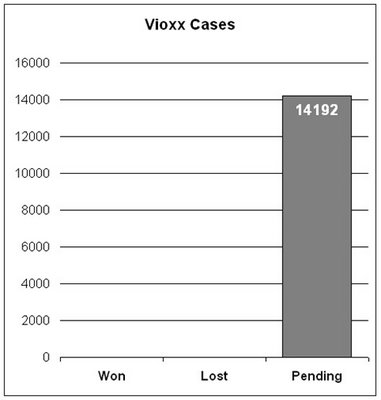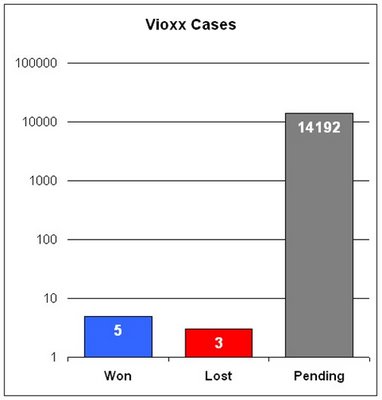As reported on CNNMoney.com, Merck won the most recent case in a Los Angeles state court on August 2, 2006, when a jury found that Vioxx did not cause the 2001 heart attack of plaintiff Stewart Grossberg, 71, a retired construction manager from Northridge, Calif. (See "Merck vows to keep fighting the Vioxx war.")
"Our scientific message got across to the jury and that confirms our litigation strategy of continuing to look at each of these cases individually, and we will be prepared to go to trial wherever these cases come up and whenever they come up," said Kent Jarrell, spokesman for Merck's outside counsel.
Les Funtleyder, analyst for Miller Tabak (an institutional trading firm), speaking of Merck's strategy, concluded "a year into this, it's proved to be prudent."
Whoa, Nellie! If drugs were proved effective on the basis of such scant evidence, we'd really be in trouble!
Funtleyder conceded it's too early to speculate whether Merck's strategy will pay off, because there are more than 14,000 cases to go. "But so far, so good," he said.
Merck has won 5 cases out of about 14,200 pending cases. It has lost 3 cases. Here's how this looks on a chart:
 I didn't forget to plot the wins and loses. The numbers are just too insignificant compared to the total number of cases. Only when you plot the data on a logarithmic scale can you see all the bars and even then the wins and loses are dwarfed by the pending cases:
I didn't forget to plot the wins and loses. The numbers are just too insignificant compared to the total number of cases. Only when you plot the data on a logarithmic scale can you see all the bars and even then the wins and loses are dwarfed by the pending cases:
What About Time and Money?
Rather than measuring wins vs. loses, there are other measures of Merck's strategy, namely:
- Will it cost more?
- Will it lead to a protracted war?
If you believe that, then I have a war in Iraq you might be interested in.
What the lawyers are really afraid of is the ADDITIONAL cases that might be filed if Merck were to cave in and settle. "[Fighting cases one on one] is a lot less expensive than to settle," said LeCroy. "Because when you start doing mass settlement, you start getting settlements of cases that might not have any merit, and you start getting cases filed that have no basis or are very weak claims. If they were going to announce a mass settlement, I wouldn't be surprised if you saw a fivefold increase in cases filed."
Hmmm... the domino theory all over again.
More troublesome than the cost, are the personnel and time resources Merck needs to allocate to this war. Analysts also predict that the Vioxx War will be a long one. Some have estimated Merck will need to endure "at least 10 years of this."
I fail to see the evidence for that rosy outlook. Simple math indicates the light at the end of the tunnel may be much farther away:
If it takes 1 year to decide the first 8 cases (the first Vioxx trial, which Merck lost, ended August 19, 2005, nearly one year ago), in what year will the last case be decided if there are a total of 14,200 cases, assuming a constant rate of settled cases per year? Corollary: If each case involves 4 employees (2 lawyers, 2 witnesses) providing 1 week of their time each, how many man-years will Merck need to invest to decide all 14,200 cases? Note: 1 man-year equals one employee working full time for 1 year, eight hours per day.Tell me your answer to the first question by taking the following poll:
The answer to the man-year corollary is 1183 man years, which sounds about the same number of man years Microsoft spent developing the Windows operating system. But at least Microsoft made a lot of money as a direct results of all those invested man years!
[P.S. I really don't know how many man years it took to develop Windows. It could have been 1100, or it could have been only 20!]

Putting aside the sarcasm of how long this will take, or how much this is costing, or how many resources Merck needs to devote to this, it is such a sad and disgusting thing that these thieves that call themselves plaintiff attorneys can do to that company and to the whole industry. They are no more than mafia extortionists.
ReplyDeleteI don't care if it takes 100 years, they should not get away with this.
May I disagree with the last poster, please.
ReplyDeleteWho speaks for the 80,000 people who took Vioxx and had heart attacks WHILE Merck knew, but did nothing about the issue other than manipulate clinical trials design to exclude "at risk" people and so try and minimise the issue.
I dont particularly like lawyers. Merck employ plenty. So plaintiffs must have them as well.
Necessary evil!?
Maybe the other side of the story? From the NY Sun:
ReplyDelete"... Take, for example, the last case Merck lost, that of Leonel Garza in south Texas. Mr. Garza, who was said by plaintiffs to have taken Vioxx for three weeks, was a 71-year-old overweight smoker, with high cholesterol, decades of heart disease, and a history of a heart attack and a quadruple bypass, yet a jury awarded his survivors $7 million in "compensatory" damages, and punitive damages to boot.
But even that story understates how outrageous the verdict was. Mr. Garza never had a prescription for Vioxx. Mr. Garza's widow testified that Dr. Michael Evans gave her husband an eight-day sample of Vioxx in a brown vial, and that then Dr. Juan Posada gave her husband two more vials filled with fifteen pills each and told him to return in thirty days. Her testimony contradicted what she said at her pretrial deposition, but she argued that her memory had improved over the intervening time. The Garza family never produced these brown vials: Mr. Garza's son testified at trial he threw them away — though his trial testimony also contradicted his deposition testimony. In turn, Dr. Posada testified that he never gave out thirty days worth of Vioxx, and never gave Vioxx to Mr. Garza. Dr. Evans testified he gave out samples only in eight-pill blister-packs. Nevertheless, the jury bought the "brown vial" theory, and held Merck liable."
and this ...
"Mr. Garza's case is hardly an exception. In the most recent New Jersey trial, Thomas Cona tried to become a "long-term" user by telling the jury that he had taken Vioxx for twenty-two months: he asserted that he only had seven months worth of prescriptions because his doctor gave him fifteen months worth of free samples. The Wall Street Journal reports that jurors in the federal Dicky Irvin trial were suspicious that Mr. Irvin had been taking several medications, but the plaintiffs "lost" all but the Vioxx. And the New York Times reports that, in the Alabama case originally scheduled to be the first Vioxx trial, the plaintiff's physical evidence of Vioxx usage consisted of a package manufactured after her husband died. (The parties agreed to a postponement on the eve of trial after Merck moved for, and the judge denied, summary judgment.) Plaintiffs dismissed with prejudice a federal case on the eve of trial under suspicious circumstances. So out of eleven cases that have gone to trial or almost gone to trial, there is a reasonable suspicion that plaintiffs faked Vioxx usage in as many as five of them. How many more of the tens of thousands of pending plaintiffs have similar flaws?"
So: why would Merck roll over and settle if plaintiff fraud appears to be so prevalent? They have a fiduciary responsibility to defend themselves in situations like this.
http://www.nysun.com/article/37517
Merck has won more than 5 cases. And the three losses aren't losses until the appeals courts rule. And who knows how many thousands of fraudulent claims Merck has deterred by standing firm.
ReplyDeleteMoreover, it's not like Merck can make the cases go away by settling. Wyeth tried to settle fen-phen, paid $21 billion, and is still getting sued.
There is so many wrong in this world that step by step one quits wondering at such cases.. May be some day things will go right.....
ReplyDeleteI suppose Merck isn't wrong to hold out on every case if they can convince juries (as they apparently can do) that scientific misconduct, hiding of information, design of studies that do not test appropriate hypotheses, statistical manipulation of data and the running of PR campaigns to discredit truthtellers is somehow OK.
ReplyDeleteIt is hard to shame people who have no shame.
Morally it stinks. To a Merck lawyer it might make sense ..... in the short term -- but I won't ever prescribe a Merck Product if there is an alternative.
The total is now up to 27,000 cases according to an article I just red, and they just had a big class action dismissed against the HMO and Insurance companies according to this story:
ReplyDeletehttp://lawsuitsandjudgments.com/merck-wins-a-big-one-in-vioxx-case-27.html
Just to put some things in perspective, according to this post taking vioxx only doubles your risk of heart disease. WUPTY FREAKIN DO!!
ReplyDeleteThat is hardly anything at all. All Merck should do is put a warning label on their packaging and keep selling the stuff. No one in my family (up to great grandparents) has ever had a heart attack, so im pretty sure I could take vioxx with every meal for the rest of my life, and I would still die of cancer or pneumonia. Here are some other risk factors that double your risk for heart disease:
1)Smoking
2)Being a dude
3)Being fat
4)Excessive drinking
5)Physical inactivity
6)Diabetes
7)Stress
8)Not loving Jesus
In conclusion, tell these people to stop complaining and moaning about their medication and to get a freaking hobby. Why don't they take up golfing or something. That will help them lower their risk for heart disease.